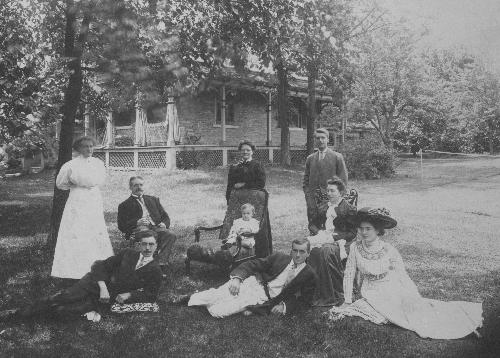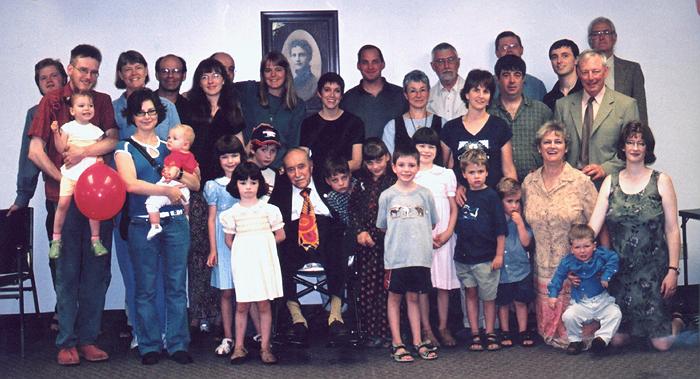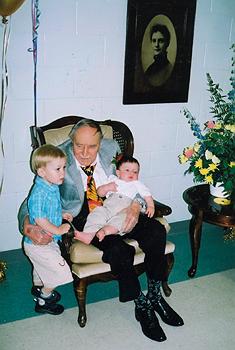Mungo Ponton, a Canadian Pioneer
A brief history of the Pontons in Canada was published in "Pioneer Life on the Bay of Quinte" (Rolfe
& Clark, 1904). It began when Mungo Ponton, a surgeon aged about 70, and his wife Grace
Nisbet came from Inverness with 8 of their 10 children. Grace's 2-greats-grandfather was James Stuart,
the Earl of Moray, and James' 2-greats-grandmother was Margaret Erskine, the favourite of King
James V of Scotland. Scottish kings had to be fighting men, and tended to die young in battle or
intrigue, so most made sure that they quickly fathered sufficient sons so that one would survive the
endless poisonings and slaughters fuelled by clan quarrels. James V kept five mistresses in public, more
in private. However, it seems that he would have married Margaret except that the Pope would not
grant her a divorce. Their son was his eldest - he named him James and created the Earldom of Doune
for him. (cf."Six Stuart Sovereigns", Eva Scott.)
As a result, it is duly recorded that I am related to most of the royal lines of Europe. The oldest
ancestors in this pedigree are Attila the Hun (5th century) and Coel Godebog ap Deheufraint, King of
Strathclyde in the 6th century, remembered by the ancient rhyme "Old King Cole". Others include the
Holy Roman Emperor Charlemagne, Louis I of France, Alfred the Great, Saint Stephen, Lady Godiva,
Saint Margaret, William the Conqueror, Eleanor of Aquitaine, Robert the Bruce...!
Several letters from Mungo Ponton are preserved in the Land Grants for Upper Canada in the
National Archives. His first application for a land grant, dated 13 August 1831, reads:
The Memorial of Mungo Ponton most respectfully sheweth That your Excellency's memorialist served
as Captain in the Lochaber Fencibles, commanded by Col.Donald Cameron of Lochiel from the year
1799 to 1802, when they were disbanded. That in the year 1829 your Excellency's Memorialist
communicated to the then Secretary at War his intention of Emigrating to Upper Canada in the event
of his being enabled to get a Grant of Land. To which communication the Secretary replied that on
presenting his Commission to the Lieut.Governor of the Colony, Lands would be granted.
Your Excellency's Memorialist respectfully states that his family consisting of Five Sons & Five
Daughters are now here, with the exception of two Sons, who are now in the West Indies, but who will
join him in the Province, on his obtaining a settled residence.
Your Excellency's Memorialist has the honor of enclosing his Commission, the Secretary at War's
letter, as well as a letter from his late Royal highness the Duke of York, when Commander in Chief, on
the same subject....
His rank of captain in the regiment was automatic for a doctor, and the supporting letters are actually
from a clerk in the Colonial department and from a secretary of the Duke. Both letters stated that he
was entitled to land, but that no passage money or other incentive would be forthcoming. The
response from the Canadian land grant officer was, in effect, that his service did not really warrant a
land grant, but that since he had been promised it in England and made his way here, some should be
found for him somewhere. He was given, presumably grumpily, four 200 acre pieces near Campbellford,
some 40 km northwest of Belleville, an area where many of his officer countrymen had settled. The land
selected was, however, caught up in a bureaucratic squabble between the Department of Education and the Crown.
After repeated requests, he finally got title to 600 of the 800 acres in 1837. The land, and the street
map of Campbellford, have hardly changed a bit since then. (When I showed an 1850's map of Campbellford
to the tourist bureau of the modern Campbellford, the general astonishment at being able to recognise
every street on it was a delightful reward for being a historian!) But history has changed - "Pioneer
Life" refers to Mungo as "a Scottish officer, who ... having retired, accepted a military land grant"!
The Ponton children did not stay there long after their father died in 1849. In fact, the two sons
mentioned in the land claim request never did settle in Canada; one stayed in Trinidad and the other
settled in North Carolina. Part of the reason may have been the intellectual climate. In the words of
the enumerator of the area for the 1851 census:
I find that the schools in this Township cause general dissatisfaction. I am told in almost every house
that the school houses are too distant or that the Teachers are incompetent.... The only children who
attend are those who are too young to assist their parents ... a large majority of (the Trustees) not
being able to read and write.
Although the 1842 census shows the Campbellford household containing 10 people, only 4 remain by
1851, and the farm is shown broken up by 1861, with no Pontons remaining in the area. According to
the Dumfries-shire & Galloway Herald & Register of 31 May 1849, Mungo Ponton was
buried at Woodland, 8 km north of Campbellford, where there was a "Free" Presbyterian church.
(There was a Presbyterian church in Campbellford, within sight of his home, but obviously something
about it was not acceptable.) Unfortunately, the Woodland church did not join the Presbyterian union
of 1875, and its records are lost, as is all trace of the church site. I have found no trace of his wife
Grace after September 1851. It is probable that she and most of her daughters were together
somewhere in 1861 - maybe I'll find their census entry some day. It is likely that she died prior to
November 1867, when her eldest daughter rejoined the John Street Presbyterian (now United) church
in Belleville that the family belonged to prior to 1847.
All three sons who stayed in Canada became active in the law in Belleville. Archibald was clerk of the
Hastings Division Court, William was registrar of the county for forty years, and James, my
great-grandfather, deputy-registrar. Archibald was also the first commanding officer (Lt.-Col.) of the
"Fifteenth", the local militia regiment, William a director of the Grand Trunk Railway, and mayor of
Belleville 1851-3. In the regrettable style of family histories of the time, the sole mention in Pioneer
Life of the daughters is that four never married.
A Sarah Henry, probably a relative of Anna Hutton, was a servant in William Ponton's home in 1851;
possibly that is how James and Anna met. Or, it might have been the other way around - Sarah might
have obtained employment because William Hutton was a justice of the peace and would have known
the Pontons. In any event, by 1871, James & Anna were settled at Sidney Cottage (then in
Sidney township), the homestead of Anna's father, William Hutton. By the time my father was born,
the homestead had passed to the third generation, William Ponton, lawyer, member of the Fifteenth
for 27 years and commanding officer 1895-1901, alderman of Belleville, and grand master of the
Ontario Masons, who lived there with his wife May (Sankey) and his sister Grace.
 Both were exceptional women. May was president of the Belleville Historical Society, president of the
Red Cross Society, Regent of the Daughters of the Empire, and was known as the "Mother of the 15th
Regiment" at the turn of the century. However, she took ill about the beginning of the Great War,
with an ovarian tumour that caused her great pain until she died. Her obituaries in the Belleville
newspapers referred to her as having a "genius for friendship ... a universal sympathy and kindliness of
disposition". Grace was well educated but, from the beginning of May's illness, gave up any career she
might have planned to run her brother's household. Sidney Cottage was a big house (16 fireplaces, I
understand), and two of William's five children were still at home. Her obituary refers to her as having,
in contrast to her sister-in-law, "gone in and out among us these many years doing good quietly and
unobtrusively, but none the less effectively", and that she was "Mother and life and pillar and guide" to
her many nephews and nieces. Especially to my father.
Both were exceptional women. May was president of the Belleville Historical Society, president of the
Red Cross Society, Regent of the Daughters of the Empire, and was known as the "Mother of the 15th
Regiment" at the turn of the century. However, she took ill about the beginning of the Great War,
with an ovarian tumour that caused her great pain until she died. Her obituaries in the Belleville
newspapers referred to her as having a "genius for friendship ... a universal sympathy and kindliness of
disposition". Grace was well educated but, from the beginning of May's illness, gave up any career she
might have planned to run her brother's household. Sidney Cottage was a big house (16 fireplaces, I
understand), and two of William's five children were still at home. Her obituary refers to her as having,
in contrast to her sister-in-law, "gone in and out among us these many years doing good quietly and
unobtrusively, but none the less effectively", and that she was "Mother and life and pillar and guide" to
her many nephews and nieces. Especially to my father.
When my grandmother Josephine knew she was pregnant, she wrote and asked her older sister to come
out to be with her for the birth. It turned out to be a fatal mistake - Grace lost her nerve at the
time of birth and, not trusting my grandfather who was an experienced veterinarian, called in a
midwife. She brought 'childbed fever', the virus also known as scarlet fever, with her and Josephine
died from it three weeks after. Her life could not have been saved even if she had had the best medical
treatment in Belleville at that time. With his father's advice, this time accepted, Grace kept her new
nephew alive with cream intended for the coffee mixed with ice cubes throughout the week-long train
trip back to Belleville, then brought him up as her child.
And so it was that my father grew up with the values of a mother who spoke half a dozen languages
(Latin and Greek included of course), who always heard when any resident of Belleville was
sick and dropped by the next day with a gift of her home baking, and whose
recipe for Christmas
Pudding was still known in Belleville 60 years after her death as Aunt Grace Ponton's Plum Pudding
(Homemaker's Dec 1983). He always said that no one could have had a finer mother than he had had.
99 years after Josephine's death, 20 of her 21 descendants were able to gather for a celebration under her photo:

 And, on my father's 100th birthday, all her descendants were still well.
The missing 21st, and a new 22nd, joined him.
And, on my father's 100th birthday, all her descendants were still well.
The missing 21st, and a new 22nd, joined him.
Sankey of Ottawa 1991
Ancestral Names
other notes on family history
 Both were exceptional women. May was president of the Belleville Historical Society, president of the
Red Cross Society, Regent of the Daughters of the Empire, and was known as the "Mother of the 15th
Regiment" at the turn of the century. However, she took ill about the beginning of the Great War,
with an ovarian tumour that caused her great pain until she died. Her obituaries in the Belleville
newspapers referred to her as having a "genius for friendship ... a universal sympathy and kindliness of
disposition". Grace was well educated but, from the beginning of May's illness, gave up any career she
might have planned to run her brother's household. Sidney Cottage was a big house (16 fireplaces, I
understand), and two of William's five children were still at home. Her obituary refers to her as having,
in contrast to her sister-in-law, "gone in and out among us these many years doing good quietly and
unobtrusively, but none the less effectively", and that she was "Mother and life and pillar and guide" to
her many nephews and nieces. Especially to my father.
Both were exceptional women. May was president of the Belleville Historical Society, president of the
Red Cross Society, Regent of the Daughters of the Empire, and was known as the "Mother of the 15th
Regiment" at the turn of the century. However, she took ill about the beginning of the Great War,
with an ovarian tumour that caused her great pain until she died. Her obituaries in the Belleville
newspapers referred to her as having a "genius for friendship ... a universal sympathy and kindliness of
disposition". Grace was well educated but, from the beginning of May's illness, gave up any career she
might have planned to run her brother's household. Sidney Cottage was a big house (16 fireplaces, I
understand), and two of William's five children were still at home. Her obituary refers to her as having,
in contrast to her sister-in-law, "gone in and out among us these many years doing good quietly and
unobtrusively, but none the less effectively", and that she was "Mother and life and pillar and guide" to
her many nephews and nieces. Especially to my father.

 And, on my father's 100th birthday, all her descendants were still well.
The missing 21st, and a new 22nd, joined him.
And, on my father's 100th birthday, all her descendants were still well.
The missing 21st, and a new 22nd, joined him.